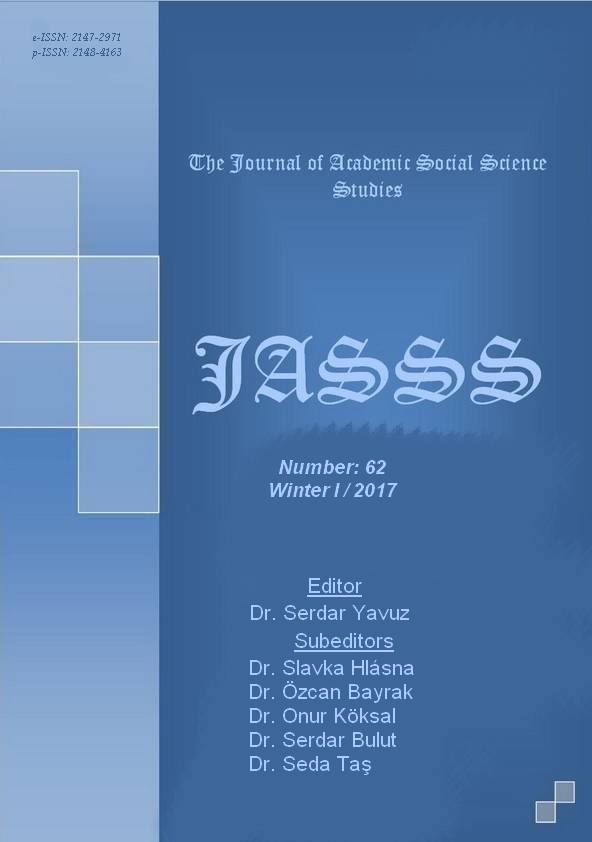TURİZM ÖĞRENCİLERİNİN KİŞİLİK ÖZELLİKLERİ: TÜRKİYE’DE LİSANS DÜZEYİNDE TURİZM EĞİTİMİNE YÖNELİK BİR DEĞERLENDİRME
Author :
Abstract
Üniversite tercihleri, bireylerin iş yaşamının en önemli belirleyicilerinden biridir. Bu doğrultuda üniversitede bölüm tercihlerini yaparken dikkate alınması gereken birçok husus bulunmaktadır. Bunlardan biri de bireylerin kişilik özellikleridir. Bireylerin kişilik özelliklerine uygun bir biçimde yaptıkları bölüm tercihleri, gerek eğitim sürecinde gerekse eğitim aldığı alanda iş yaşamına katılmasında ve iş yaşamındaki başarısında önemli bir yer tutmaktadır. Turizm mesleği çok farklı kültürden insanlarla bir arada olmayı, iyi iletişim kurmayı ve duygusal çabayı gerektirdiğinden, bu meslekte yer almak isteyen bireylerin de belirli kişilik özelliklerini taşımaları önemlidir. Bu araştırmanın amacı, Türkiye’de lisans düzeyinde turizm eğitimi alan öğrencilerin kişilik özelliklerini belirleyerek turizm eğitimi kapsamında öneriler sunabilmektir. Bu kapsamda 8 üniversitede lisans düzeyinde turizm eğitimi alan 828 öğrenciye beş faktör kişilik kuramı çerçevesinde açıklık, dışadönüklük, öz disiplin, uyumluluk ve duygusal denge olmak üzere beş boyuttan oluşan kırk dört soruluk anket uygulanmıştır. Elde edilen veriler istatistik paket programı ile analiz edilmiştir. Buna göre deneyime açıklık ve öz disiplin boyutu en yüksek kişilik özelliğini ifade ederken, en düşük kişilik özelliği ortalaması ise duygusal denge boyutundadır. Öğrencilerin kişilik özelliklerinin demografik özelliklerine göre farklılıklarını tespit edebilmek amacıyla gerçekleştirilen bağımsız örneklemler için t testi ve tek yönlü varyans analizleri sonuçları, öz disiplin boyutunun öğrenim görülen sınıfa göre, duygusal denge ile deneyime açıklık boyutlarının ise öğrencilerin ailelerinin gelir durumuna göre farklılık gösterdiğini ortaya koymuştur. Araştırmanın bulguları ve sonuçları turizm eğitimi kapsamında değerlendirilmiştir.
Keywords
Abstract
University preference is one of the most important determinants of an individual's business life. In this respect there are many elements to be considered when making department preferences in the university. One of these elements is an individual's personality. The department preference an individual makes in accordance with their personality traits plays an important role in the education process and their employment in the field they trained as well as the success in business life. It is important for the tourism professionals to have certain personality traits , because it is required to interact with people from different cultures, communicate well with them and displaying emotional effort. The purpose of this research is to determine the personality traits of the students who are studying at undergraduate level in Turkey and to present suggestions in the future of tourism education. In this context, a questionnaire consisting of five dimensions including openness, extroversion, self-discipline, compatibility and emotional balance was applied to 828 students who had undergraduate tourism education in 8 universities within the framework of five factor personality theory. The obtained data were analyzed with statistical package program. According to analysis, it is found that experiential openness and self-discipline dimension express the highest personality trait, while the lowest personality trait is the emotional balance dimension. The results of the t test and the one-way analysis of variance for the independent samples in order to determine the differences according to the demographic characteristics of the students revealed that the self discipline dimension differs according to the education class and the emotional balance and the experiential openness dimensions differ according to the income status of the families of the students. The findings of the study and its results have been evaluated in the context of the future of tourism education.





